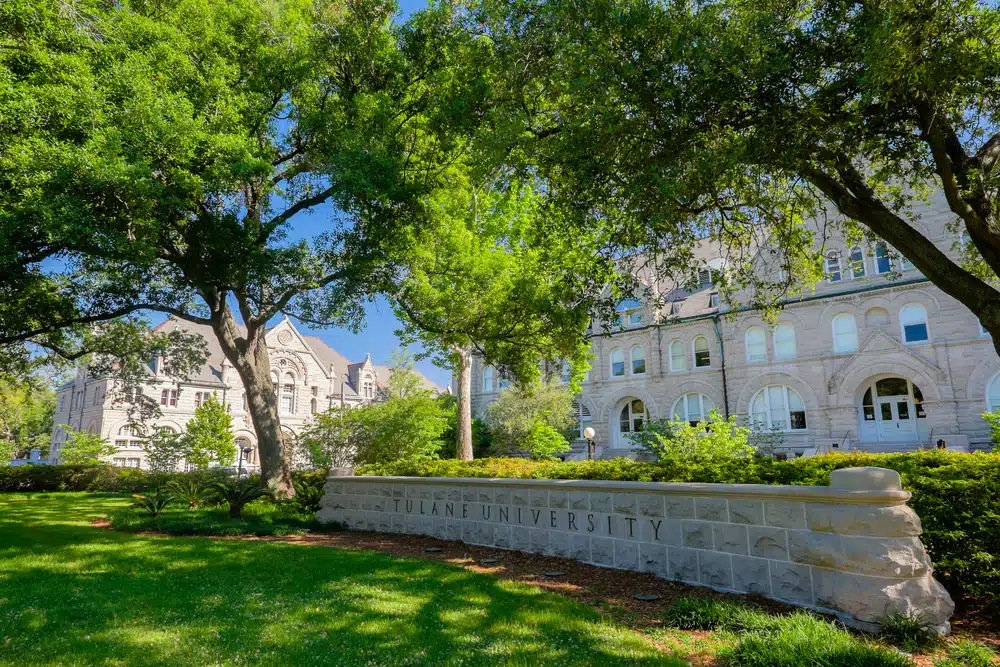An In-Depth Look at Tulane University’s Ranking: Where Excellence Meets Tradition
When it comes to quality education and prestige, Tulane University’s ranking always merits recognition. This renowned institution, nestled in the heart of New Orleans, Louisiana, is known not just for its rich history and unique culture but also for its consistently high rankings among national universities.
Whether it’s academic excellence, research productivity, or student satisfaction, Tulane University’s ranking echoes its commitment to providing an enriched learning environment that fosters innovation, creativity, and critical thinking.
With a multitude of ranking systems and criteria, understanding Tulane University’s ranking might seem like a complex task. However, when scrutinized carefully, each ranking sheds light on different facets of this prestigious institution, painting a comprehensive picture of what it truly offers.
The university’s consistently strong performance in various ranking categories testifies to its resilience, dedication to scholarship, and commitment to student development and success. Together, these factors contribute to Tulane University’s standing as a distinguished institution in the higher education landscape.
Tulane University: An Overview
Tulane University is a private research university located in New Orleans, Louisiana. Founded in 1834 as the Medical College of Louisiana, it is the oldest private university in the American South and one of the most respected educational and research institutions in the country. The university is named after its benefactor, Paul Tulane, a wealthy merchant who donated generously to the education of New Orleanians in the late 19th century.
The university is composed of ten schools and colleges, offering programs in fields as diverse as architecture, business, law, liberal arts, medicine, public health, and sciences. Among these, the Tulane University Law School and Tulane University School of Medicine are particularly renowned, having produced distinguished alumni in their respective fields.
The academic breadth offered at Tulane is extensive, featuring more than 75 majors across a range of disciplines. Each of the ten schools and colleges within the university has its unique strengths and areas of focus.
Tulane is classified as an “R1: Doctoral Universities – Very high research activity” institution, according to the Carnegie Classification of Institutions of Higher Education. This indicates the university’s commitment to cutting-edge research and scholarly inquiry.
Situated in one of the country’s most vibrant and culturally rich cities, Tulane offers students a unique blend of scholarly rigor and life-enriching experiences. The University is known for its strong community engagement, with a core requirement that undergraduates participate in public service activities.
In all, Tulane University is a prestigious institution that blends tradition with innovation, offering a diverse range of programs and a rich campus life. Its commitment to research, teaching, and public service makes it a unique place to study and grow, academically and personally.
What is the Ranking of Tulane University?
What is the ranking of Tulane University? In the competitive landscape of higher education, rankings often serve as a measure of an institution’s commitment to academic excellence, research innovation, and overall student experience.
Among the myriad of universities that dot this landscape, Tulane University stands out as a premier institution, renowned for its rich history, diverse programs, and community engagement. But where does Tulane stand when we turn our attention to university rankings?
U.S. News & World Report
According to the U.S. News & World Report’s 2022-2023 Best Colleges Rankings, Tulane University was ranked as the #44 best National University in the United States. The rankings provided by U.S. News & World Report are among the most respected and referred to in the field of higher education, making this a significant recognition of Tulane’s commitment to excellence.
The U.S. News & World Report rankings are determined based on a number of factors, each highlighting a different facet of a university’s operations. To reach this prestigious ranking, Tulane excelled in several areas.
Firstly, academic quality carries significant weight in the U.S. News & World Report rankings, and Tulane’s consistent commitment to high academic standards was a key contributor to its position. The rankings consider elements such as class size, student-to-faculty ratio, and the academic qualifications of the faculty, all of which are areas where Tulane performs exceptionally well.
Secondly, the ranking takes into account a university’s reputation among its peers and high school guidance counselors. The opinion of these informed observers gives a sense of a school’s standing within the academic community, and Tulane’s robust reputation is recognized in its strong score in this category.
Thirdly, the financial resources available to a university are an essential part of the ranking formula. Such resources indicate a school’s capacity to invest in high-quality faculty, infrastructure, and student services. Tulane’s substantial endowment and commitment to investing in its academic offerings and campus facilities have helped it excel in this area.
The selectivity of the admissions process also influences rankings. A more selective admissions process generally indicates that a school is attracting high-achieving students, which in turn contributes to the overall academic environment of the university. Tulane University is known for its selective admissions, reflecting its appeal to high-achieving students and enhancing its standing in the rankings.
Times Higher Education World University Rankings
Tulane University is ranked between 351st and 400th in the Times Higher Education World University Rankings for 2023. In the US College Rankings for 2022 by the same organization, it’s ranked 71st.
The Times Higher Education World University Rankings is a global university performance table that judges research-intensive universities across core missions: teaching, research, knowledge transfer, and international outlook. These metrics are grouped into five areas:
Teaching (the learning environment): It includes a reputation survey (15% of the total ranking score), staff-to-student ratio (4.5%), doctorate-to-bachelors ratio (2.25%), doctorates-awarded-to-academic-staff ratio (6%), and institutional income (2.25%).
Research (volume, income, and reputation): It also involves a reputation survey (18% of the total score), research income (6%), and research productivity (6%).
Citations (research influence): This single indicator is given a weighting of 30% of the overall score.
International outlook (staff, students, and research): It includes the international-to-domestic-student ratio (2.5%), international-to-domestic-staff ratio (2.5%), and international collaboration (2.5%).
Industry Income (knowledge transfer): It’s measured by how much research income an institution earns from the industry (adjusted for PPP), accounting for 2.5% of the total score.
The ranking system is comprehensive and aims to provide a balanced comparison, which explains why these rankings are often cited in discussions about university excellence. Rankings in the 351-400 range indicate that Tulane University has a strong presence on the global stage. The 71st position in the US College Rankings signifies that it’s also highly regarded nationally.
QS World University Rankings
Tulane University is ranked 471st in the QS World University Rankings for the year 2023.
The QS World University Rankings is an annual publication of university rankings by Quacquarelli Symonds (QS). It is considered one of the three most influential and widely observed international university rankings, alongside the Times Higher Education World University Rankings.
The QS World University Rankings evaluates universities based on six metrics:
Academic Reputation (40%): This is assessed using a global survey, in which academics are asked to identify the institutions where they believe the best work is currently taking place within their field of expertise.
Employer Reputation (10%): This is also based on a global survey, but this time employers are asked to identify the universities they perceive to be producing the best graduates.
Faculty/Student Ratio (20%): This is a measure of the number of academic staff employed relative to the number of students enrolled.
Citations per Faculty (20%): This is a measure of the research impact.
International Faculty Ratio (5%): This is an indicator of the diversity of the university staff members.
International Student Ratio (5%): This is an indicator of the diversity of the student community.
Given these metrics, we can evaluate Tulane University’s potential performance in these areas. Tulane University has a strong academic reputation, backed by its ranking in U.S. national rankings and its reputation among academics and professionals. The university also boasts a low student-to-faculty ratio, indicative of its commitment to providing personalized attention to students, a factor that could boost its score in the faculty/student ratio category.
In terms of research impact, Tulane is recognized as an R1 Research institution (a designation given by the Carnegie Classification of Institutions of Higher Education to universities in the U.S. that engage in extensive research activity), which might be favorable in the “citations per faculty” category.
As for the diversity of faculty and students, Tulane has a diverse student body and faculty, with students and faculty members coming from all 50 U.S. states and more than 85 different countries.
While Tulane University’s ranking provides a useful guide for comparing institutions, it’s important to note that Tulane’s ranking is just one aspect of what makes it a unique and esteemed institution. The essence of Tulane—its vibrant student life, comprehensive academic offerings, commitment to community engagement, and location in the culturally-rich city of New Orleans—provides an enriching educational experience that transcends numbers.
Why Do College Rankings Matter?
Why do college rankings matter? College rankings matter for Tulane University, and indeed for all universities, for several reasons. They play a crucial role in shaping a university’s reputation, attracting top talent, securing funding, and driving improvements in education and research.
Firstly, college rankings serve as an external validation of a university’s quality and performance. They reflect the effectiveness of the university’s academic programs, faculty, research initiatives, and more. When Tulane University earns a high ranking, it signifies that the institution is excelling in areas that are critical to providing high-quality education and fostering cutting-edge research. This, in turn, enhances Tulane’s reputation and visibility on both a national and international scale.
Attracting top talent is another area where college rankings matter. High rankings can draw high-achieving students and distinguished faculty to the university. Students use rankings to help make decisions about where to apply and enroll, often seeking institutions that are recognized for their excellence. Similarly, accomplished faculty are drawn to institutions that are known for their academic rigor and research productivity. For Tulane University, high rankings can therefore help to create a vibrant and intellectually stimulating community of students and faculty.
Thirdly, rankings can influence the allocation of funding. Many public and private entities use rankings as one of the factors when deciding which universities to support. Universities that rank high are often seen as a good investment because they are more likely to produce impactful research and successful graduates. For Tulane, a strong ranking contributes to securing funding for research, scholarships, infrastructure improvements, and other important initiatives.
Rankings also play a role in driving institutional improvements. They provide a benchmark for Tulane University to measure its performance against other institutions and identify areas for improvement.
The metrics used in rankings, such as student-to-faculty ratio, graduation rate, and research productivity, highlight areas where the university is excelling and where there may be opportunities for growth. This can help Tulane University make strategic decisions that further enhance the quality of education and research it offers.
Lastly, rankings matter for Tulane University because of its impact on the broader community. High rankings enhance the prestige of a Tulane degree in the job market and can be a source of pride for alumni and the local community. They can also draw attention to Tulane’s contributions to society, including its research discoveries and the achievements of its students and faculty.
However, it’s important to remember that while Tulane University’s ranking is significant, it’s just one measure of a university’s quality and impact. They do not capture everything that makes a university unique or outstanding. For Tulane University, its commitment to community engagement, its diverse and inclusive community, and its location in the vibrant city of New Orleans are all part of what makes it a distinguished institution that offers a transformative educational experience.
What is the Benefit of Tulane University’s Ranking in College Application?
What is the benefit of Tulane University’s ranking in college application? The ranking of Tulane University plays a significant role in the college application process, bringing multiple benefits to prospective students, the university, and the broader community.
From a prospective student’s perspective, Tulane University’s ranking is indicative of the university’s commitment to academic excellence and can serve as an assurance of a high-quality education.
As students navigate the college application process, they are often seeking institutions that will provide them with the best opportunities for learning, personal growth, and future success. A high ranking can serve as an endorsement of the quality of the institution’s academic programs, faculty, and facilities, which are critical factors in a student’s decision-making process.
Tulane University’s ranking can also be a strong predictor of a vibrant intellectual community. Universities with high rankings tend to attract high-achieving, motivated students, which can enhance the overall educational experience.
The opportunity to learn with and from peers who are similarly committed to academic excellence can greatly enrich a student’s time at university. Therefore, Tulane’s ranking can give prospective students confidence that they will be joining a community of academically driven and diverse individuals.
Moreover, high-ranking universities like Tulane often have strong connections with employers and a well-respected reputation in various industries. This can open doors for internships, job placements, and networking opportunities for students and graduates. A degree from a highly-ranked university like Tulane can be a significant advantage in the job market and can enhance a graduate’s career prospects.
For Tulane University, its high ranking helps attract a diverse pool of talented applicants from across the country and worldwide. This allows the university to select a strong, vibrant, diverse student body, further enhancing its educational environment and reputation.
In terms of the broader community, Tulane University’s ranking can also impact the local economy and society. High-ranking universities are often significant contributors to their local economies through direct employment, attracting students and faculty who spend money locally, and through partnerships with local industries. Tulane University, in particular, has a significant impact on the city of New Orleans through its various programs and community service initiatives. Its ranking helps bring attention to this impact and enhances its ability to contribute positively to the community.
While rankings should not be the only factor in choosing a university, they do provide valuable information that can inform the decision. For prospective students, Tulane University’s ranking offers confirmation of the university’s commitment to academic excellence, a vibrant intellectual community, and excellent future opportunities.
Conclusion
Ultimately, Tulane University’s ranking paints a picture of an institution dedicated to providing a well-rounded, high-quality education. Its consistently high rankings reflect its commitment to academic excellence, research prowess, diversity and inclusion, and student satisfaction.
Tulane University’s strong ranking across different aspects is a testament to its core values and a sign of its unwavering dedication to excellence in higher education. For students considering Tulane, these rankings illustrate the university’s commitment to providing an enriching environment where one can flourish both academically and personally.
Want to learn more about your chances of getting into Tulane University? You’ve come to the right place. At AdmissionSight, we have over 10 years of experience guiding students through the competitive admissions process.
AdmissionSight can help you put your best foot forward when applying to college this fall. Contact us today for more information on our services.








































